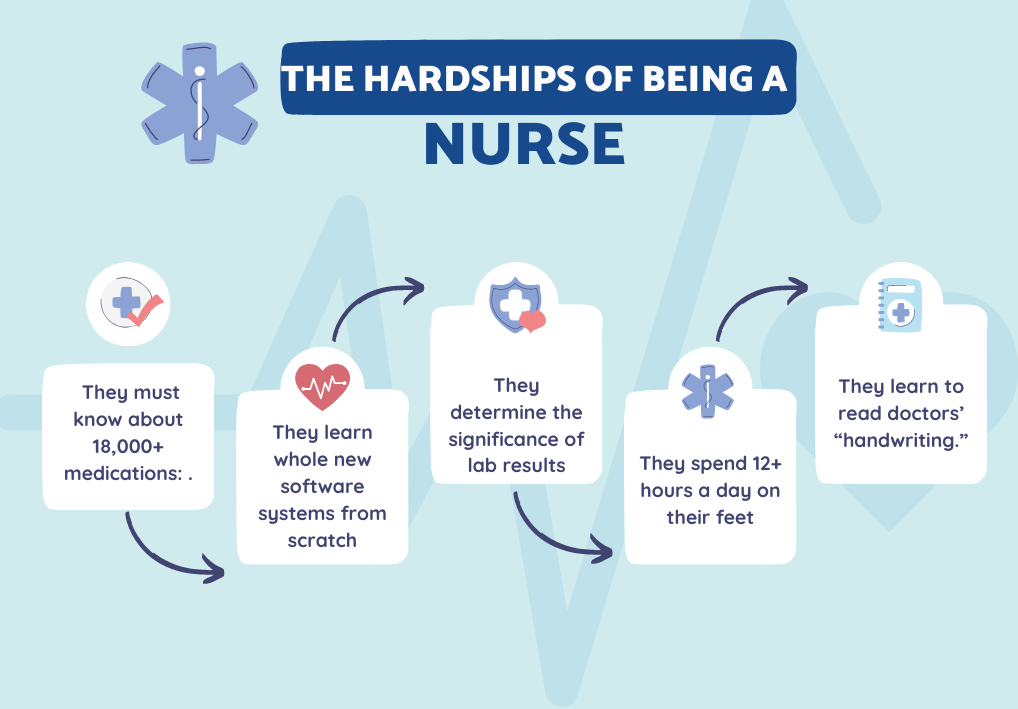Hey there, folks! First of all, I would like to introduce myself and tell you a little about myself. I’m Jean Chavez, a nursing student and hospital worker from New York. Balancing work, studies, and family time is no easy task. But I’m determined to pursue my dream of becoming a nurse while cherishing moments with my wife and 2-year-old daughter. As a freshman in nursing school, I’ve been hit with a wave of tasks and responsibilities that have left me overwhelmed and exhilarated.
In this article, I’ll share why is nursing school so hard, supported by stats and personal stories. But don’t worry, I’ll also reveal how I manage to maintain my mental and physical well-being amidst this chaotic journey. Let’s dive in!
The Academic Challenge: Balancing Books and Practical Skills
How to succeed in nursing school? Studying nursing involves a big academic challenge: juggling book smarts with hands-on skills. As a nursing student, I must learn a lot from books and classes and practice what I’ve learned in real hospitals. Finding the right balance between learning from books and actually doing things in the real world can be challenging. But I need to become a good healthcare professional.
So, how hard is nursing school? The numbers back up the demanding nature of medical education.
A recent study shows that nursing students spend around 20 hours per week attending classes. And on top of that, they put in an extra 15 hours of study time outside of class.
That’s a significant commitment! Especially when you have other responsibilities like work and family. The sheer volume of information to learn and remember can make nursing school feel like a constant uphill battle.
From my own experience, I’ve grappled with the complexity of the coursework and the practical demands of nursing.
The subjects we cover are hard. They range from anatomy and physiology to pharmacology and medical-surgical nursing. Truly grasping these concepts takes dedication, focus, and countless hours of studying.
And it doesn’t stop there. Applying what I’ve learned in real clinical situations requires new skills, such as giving medications and performing medical procedures.
But through these challenges, I’ve grown as a nursing student. I’ve learned to embrace academic rigour and discover effective study strategies. Working with classmates in study groups, participating in interactive activities, and seeking help from experienced teachers have all helped me overcome challenges with my schoolwork.
Even though I agree with those who consider nursing school hard, I would say it’s worth it because I get to learn a lot, improve my thinking skills, and gain practical knowledge. By balancing what I learn from books with real-life experience, I’m building a strong base for my future as a healthcare professional.
So, my fellow future nurses, remember that even though school may feel tough sometimes, we can overcome it! And we can become skilled healthcare professionals if we keep trying and stay determined.
The Emotional Rollercoaster: Overcoming Stressful Situations
How hard is nursing? As a nursing student, I go through many ups and downs emotionally. I face stressful situations that test how strong and composed I can be. It can be overwhelming, like when I have tough exams or see patients in critical condition. But I’ve learned helpful ways to handle these challenges and take care of my emotions with the support of my friends.
One significant source of stress in nursing school is the pressure of exams and assignments.
The sheer volume of information to absorb and the need to perform well academically can lead to heightened anxiety and stress. It’s common to feel nervousness and self-doubt before a big test. But I realized that everything can work out if you allocate your time correctly. Namely, you should make a study schedule and break the material into smaller parts, which can make things less stressful. It also helps to ask professors for help or join study groups. They give me support and help me feel more confident.
Another aspect of the emotional roller coaster is observing critical situations and communicating with sick patients.
The responsibility of caring for someone’s health and well-being can feel overwhelming at times. It’s important to acknowledge and address these emotions.
Getting advice from experienced nurses and instructors has been really helpful for me in dealing with these tough situations. It’s also important to take care of myself by doing things like practicing mindfulness or engaging in hobbies to manage stress and stay emotionally balanced.
Having support from other nursing students has been really essential too. Talking to people who know what it’s like and sharing our experiences and worries helps us feel like we’re in it together and gives us emotional support. We can lean on each other during challenging times, offering encouragement and understanding.
Nursing school can be emotionally challenging, but self-care and support are crucial. We can overcome obstacles and strengthen our resolve on our journey to becoming compassionate healthcare professionals! To do this, seek help and rely on friends.
Time Management: Mastering the Art of Balancing Responsibilities
The question remains: Is nursing school hard? As a nursing student juggling work, studies, and family, mastering the art of time management has become essential in my daily life. With many responsibilities vying for my attention, it can be challenging to find the right balance. Yet, I have learned to optimize my time and stay on top of my commitments by implementing effective strategies and prioritizing tasks.
One of the key components of successful time management is creating a schedule. I set clear goals and assign specific time slots for each task to manage my time effectively. Using calendars and to-do lists helps me stay organized and remember important deadlines and appointments.
Prioritizing tasks is also important. I distinguish between urgent and important tasks. First, I focus on those that need immediate attention. By tackling high-priority tasks first, I reduce stress and make sure I complete critical responsibilities on time.
Creating a suitable work environment is crucial for maximizing productivity. I cut distractions like phone notifications and find a quiet study space to stay focused. Breaking larger tasks into smaller segments helps me make progress without feeling overwhelmed.
Along with time management, prioritizing self-care is equally significant. Taking breaks, getting restful sleep, and doing activities that rejuvenate me is vital for my well-being. By including self-care in my daily schedule, I avoid burnout and tackle my tasks with renewed energy and concentration.
When my friends ask me, “Is nursing really that hard?”, I always reply that being a nursing student comes with challenges, but I’ve found ways to handle them.
By managing time well and taking care of myself, I’ve stayed on top of things and achieved my goals. Remember, mastering time management is critical for your studies and future careers. So, seize the day, plan wisely, and make the most of every moment!
Constant Learning: Staying Updated in a Rapidly Evolving Field
Nursing school is hard, and staying updated is crucial to providing patients with the best care. I rely on various strategies and resources to navigate this rapidly evolving field. First, I engage in continuous education and professional development opportunities. This involves attending workshops, conferences, and seminars to enhance my knowledge and skills. By participating in these events, I stay updated with the latest healthcare advancements. I also connect with like-minded professionals and exchange valuable insights.
I read reliable journals and use evidence-based resources to stay updated on the latest research and best practices in nursing. I also get help from experienced nurses and instructors with much knowledge and experience. They mentor and guide me, so I can understand the complexities of nursing and stay informed about new trends and improvements.
I recognize the need to adapt to new technologies and procedures in this rapidly evolving field. By embracing these advancements, I can provide more efficient and effective care.
I keep up with the latest medical tools and technologies so that I can use them in my work. Learning constantly and staying updated is important for my professional growth and for the well-being and safety of my future patients. With each new piece of knowledge I get, I become better equipped to make informed decisions and provide the highest standard of care.
Prioritizing Exercise: The Power of Movement
Is nursing school difficult? Yes! Being a nursing student means having a busy schedule, but I’ve learned how important exercise is for my well-being. Regular physical activity has made a huge difference in managing nursing school, work, and family demands.
Exercise isn’t just about getting fit—it also greatly impacts mental health. When I exercise, whether it’s jogging, going to the gym, or joining a fitness class, I feel a rush of “feel-good” hormones called endorphins. These endorphins help me reduce stress, improve my mood, and feel better overall.
Exercise is important for managing stress. Studies show that being active can reduce stress hormones like cortisol and adrenaline. For example, a study in Investigacion y Educacion en Enfermeria found that nursing students who exercised regularly had lower stress levels. Also, they can have better mental well-being than those who exercised less.
Exercise also improves cognitive function and academic performance. When I exercise, I find that I can concentrate better, retain information, and stay focused while studying. A Harvard Health publication confirmed that regular exercise improves memory, attention, and processing speed.
To make sure I focus on exercise in my busy schedule, I set aside a specific time each day for physical activity. I might wake up early for a morning workout, take walks during breaks, or find time for short exercise sessions throughout the day. I choose activities I enjoy, like dancing or playing a sport, to keep myself motivated and consistent.
Practicing Mindfulness: Nurturing Mental Well-Being with Evidence-Based Benefits
I’ve discovered the cool benefits of practicing mindfulness to support my mental well-being. Using mindfulness techniques helped me navigate the challenges of nursing school, work, and family life. And sometimes, after practicing these techniques, I ask myself – is nursing school really that hard? And my answer becomes negative.
Mindfulness involves paying deliberate attention to the present moment without judgment. By cultivating this practice, I have experienced many positive effects on my mental health and overall well-being.
Research has consistently shown that mindfulness can reduce stress and anxiety levels. When I engage in mindfulness exercises, such as deep breathing or guided meditation, I can quiet my mind and find a sense of calm amidst the chaos.
In fact, a study published by the Psychiatric Clinics of North America found that mindfulness-based stress reduction programs significantly reduce symptoms of anxiety and depression.
Furthermore, practicing mindfulness has been linked to improved focus and concentration. This is crucial for retaining information and performing academically as a nursing student. By incorporating mindfulness into my daily routine, I am better able to stay present and engage in my studies, enhancing my learning experience.
Additionally, mindfulness has been shown to enhance resilience and emotional well-being. It helps me develop a greater awareness of my thoughts and emotions. It allows me to respond to challenging situations with clarity and composure. Research published in the Asian Journal of Sport and Exercise Psychology has found that mindfulness training can increase resilience and improve emotional regulation.
I set aside dedicated time for mindfulness exercises to incorporate mindfulness into my daily life. This may include short meditation sessions in the morning or evening. Doing mindful breathing exercises during study breaks or even integrating mindfulness into everyday activities such as eating or walking can reduce stress. By consistently practicing mindfulness, I have experienced a positive impact on my mental well-being. Additionally, it has helped me improve my focus and cultivate a sense of calm in my daily life.
Building a Supportive Network: The Strength of Connections and Its Impact on Health
As a nursing student, I have come to appreciate the immense value of building a supportive network to enhance my well-being.
The relationships I have built with classmates, colleagues, and mentors have greatly influenced my physical and mental well-being.
Having a strong support system is crucial for managing the demands of nursing school, work, and personal life.
Being able to lean on others during challenging times provides comfort and encouragement. Whether it’s about seeking advice, sharing experiences, or simply having someone to talk to, my support network has been a source of strength and resilience.
Research consistently demonstrates the positive influence of social connections on health. Strong social support networks have been linked to reduced stress and improved well-being. Building a supportive network has allowed me to grow personally and professionally.
I connect with like-minded individuals through networking events, professional organizations, and study groups. These activities help me build a supportive network to engage in valuable discussions. Also, it helps me share knowledge and resources and receive guidance from experienced professionals. These connections broaden my perspective, enhance my skills, and create new opportunities. I also highly rank cultivating relationships with mentors who offer guidance, support, and valuable insights into nursing.
Concluding Remarks
So, the question was why nursing school is so hard. Now, let’s briefly go through the main insights of this article. Nursing is hard, but we can overcome its challenges.To succeed, we must balance learning theory and practical skills. Also, we need to study effectively, work together with classmates, and ask experienced teachers for help. Managing our emotions is also important. We can take care of our well-being by using stress management techniques, leaning on our nursing peers, and seeking guidance.
Time management is crucial for balancing work, studies, and personal life. Creating schedules, prioritizing tasks, and taking care of ourselves prevent burnout. Exercise is vital for our physical and mental health. It reduces stress, improves cognitive function, and enhances academic performance.
Mindfulness is another powerful tool. It reduces stress and anxiety, improves focus, and enhances resilience. By practicing mindfulness techniques, we can find peace and handle challenges better. Building a supportive network is essential. Surrounding ourselves with like-minded individuals is very important. Seeking advice and engaging in meaningful discussions reduce stress and provide opportunities for personal and professional growth.
Despite the difficulties, we can succeed in nursing school. We can become skilled and compassionate healthcare professionals with determination, effective strategies, and self-care. Let’s embrace the journey, support each other, and celebrate the rewards of this noble profession. I hope you’ve enjoyed it and learned something new.






